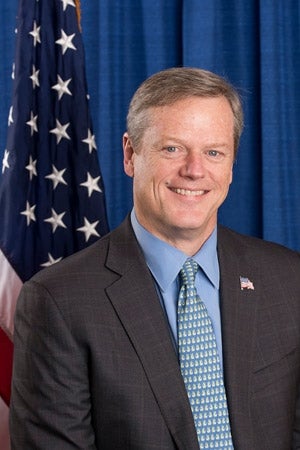Gov. Charlie Baker on Friday directed his administration to confront climate change on two fronts, reducing greenhouse gas emissions contributing to the planetary warming trend and preparing the Bay State for the ravages of the climate future.
In response to a Supreme Judicial Court ruling in May, Baker issued an executive order directing the Department of Environmental Protection to establish new declining aggregate emission limits for the Massachusetts Department of Transportation.
The order requires the department to promulgate emissions reduction regulations taking into consideration reductions in leaks from the natural gas distribution system, emissions permits, and the transportation sector, including state government’s vehicle fleet.
The order demands reports laying out the state strategy for energy and for climate change adaptation by September 2018, and encourages the state’s environmental and energy agencies to “lead by example” reducing their own carbon emissions.
The governor’s order bears some resemblance to legislation filed by Taunton Sen. Marc Pacheco and Brookline Rep. Frank Smizik, which would direct the state to develop a climate change adaptation plan and require that state permits be issued in accordance with that plan.
Pacheco, who praised Baker in a bipartisan display Friday, noted the order applies only within the executive branch and does not require that state permits be issued in harmony with the climate change plan.
“The essence of the comprehensive adaptation management plan is in the executive order. There are provisions that could not be in the executive order because they would need legislative approval,” Pacheco told the News Service. Pacheco said the Senate had passed the legislation three times, but it never cleared the House.
Smizik said the bill never cleared the House because “they didn’t agree with what this bill did,” and he said there are “more conflicts” between the Democratically-led House and Senate than between the Senate and the Republican administration.
Working jointly, Secretary of Energy and Environmental Affairs Matt Beaton and Secretary of Public Safety and Security Dan Bennett are directed to develop a framework for each executive office and agency’s vulnerability to climate change, and a framework for municipalities to assess their vulnerabilities as well as providing cities and towns with technical assistance.
Baker said Bennett would play such a major role in the plan’s development in part because his office has jurisdiction over the building code.
The climate adaptation plan that Beaton and Bennett will develop will include climate trends, clear goals, guidance for building adaption and resiliency, and use of natural resources to boost preparedness.
On Friday, Baker noted the relentless snow and cold that battered the region in 2015, shortly after he took office, and the summer-long drought that’s about to spill into fall. More than half the state is now in an extreme drought, damaging crops and draining drinking water reservoirs.
“This is all happening in our administration. How come you haven’t figured this out yet?” Baker joked Friday.
August 2016 was the hottest month in 136 years of recording keeping, tying July 2016, the National Aeronautics and Space Administration reported on Monday. NASA said August “continued a streak of 11 consecutive months dating back to October 2015 that have set new monthly high-temperature records.”
“If you don’t plan for change, you can easily become its victim,” Gloucester Sen. Bruce Tarr, the Senate minority leader, said. “I have seen that firsthand. I have stood on the shore and watched someone’s home wash into the ocean, and I never want to see it again.”
Environmentalists praised the governor’s action. The Nature Conservancy applauded the order’s reference to using of natural resources – such as planted trees, oyster beds and salt marshes – to protect the coastline and trap greenhouse gases. Steve Long, the group’s government relations director, said in Massachusetts forests absorb 15 percent of the carbon emitted every year.
Veronica Eady, the Massachusetts director of the Conservation Law Foundation, which successfully sued the state along with Mass Energy, said the state could seek to reduce emissions in the transportation sector by upgrading fleets of vehicles – perhaps even private fleets such as rental cars – and mentioned the possibility of congestion pricing, while putting a premium on improved public transit.
“I honestly think that improving the T is going to get people out of their cars,” Eady said.
Eugenia Gibbons, the clean energy program director for Mass Energy, said in a statement that “true success will be measured by” whether Massachusetts is able to meet its goal of reducing greenhouse gas emissions by 25 percent below 1990 levels in 2020. Erica Mattison, legislative director of the Environmental League of Massachusetts, said the group is pleased the Baker administration supports “proactive measures to prepare for the impacts of climate change.”
The order directs the Department of Environmental Protection to publish a regulatory notice by Dec. 16 and hold a hearing no later than Feb. 24, issuing new regulations that address the transportation sector by Aug. 11, 2017.
The department is also directed to establish an internet portal for the public to make suggestions.

